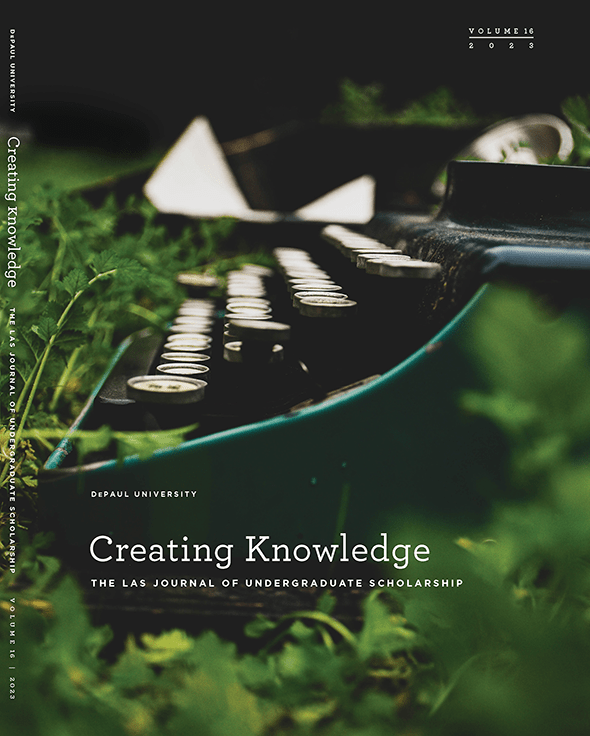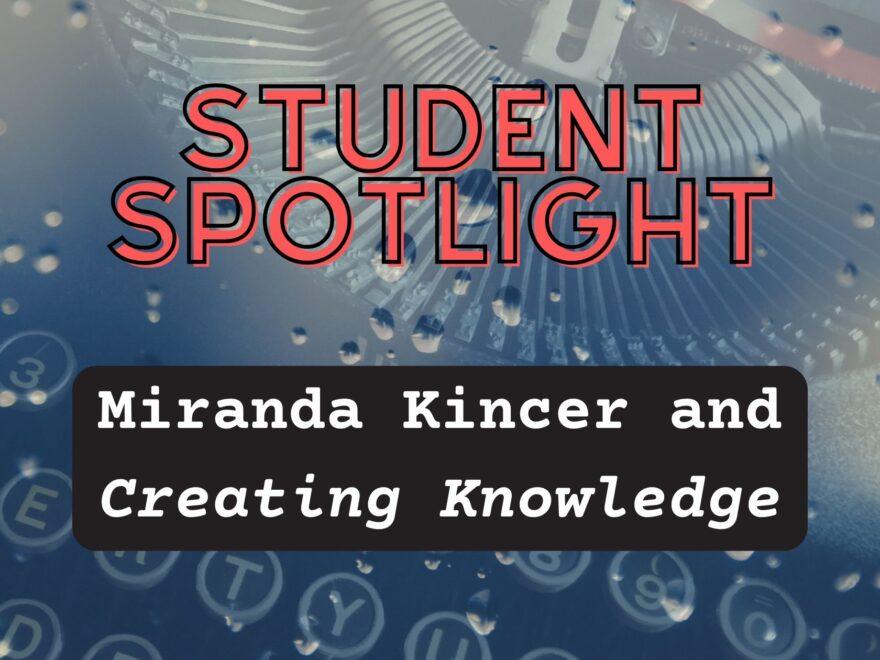
Throughout 2023, WRD student Miranda Kincer worked on and published scholarship in DePaul’s undergraduate journal, Creating Knowledge. Her piece, “Tony Stark as an Icon for Alcoholism and Recovery: How Details in Iron Man #182 Reveal the Detriment of Alcohol Addiction” won out in the competitive landscape of student works, where only one piece is published per university department. Representing WRD, Miranda reflects on her time before, during, and after publication. Read on to hear about Miranda’s experience of publication and gain insights into how and why you might publish work as well.
What inspired you to write this piece and submit to Creating Knowledge?
MK: Before I took the course [WRD 287, The Comic Book as Visual Argument, which I wrote this piece for] with Dr. Ackmann, I went to the special exhibition on Marvel Comics at the Museum of Science and Industry during the summer of 2021. That exhibition walked visitors through Marvel Comics, from Captain America and the Fantastic Four all the way to the Marvel Cinematic Universe today. They had several comics on display that are now big collector’s items, and the one that really blew me away was Iron Man Issue #128 “Demon in a Bottle.” In that cover, Iron Man is mask-off, Tony Stark, looking afraid of himself in the mirror with a bottle of whiskey sitting beside him. That really had an impact on me. Seeing that cover that really put a real issue like addiction on full display, humanizing both addiction and the hero in the process.
When it came time to do a research project for class, I went to the comic book store and picked up Issue #182 that dealt with similar themes. In the end, my paper demonstrated that comic books are valuable sources for understanding history and culture, and that perspective felt relevant and interesting for submission to Creating Knowledge.
How was the process of revision to get the piece ready for publication? Who did you work with for feedback and advice?
MK: I worked with Dr. Tim Elliott during the revision process. Dr. Elliott has a background in researching and writing about comic books, which made the process of revision—which can be tedious—a bit more enjoyable for both of us. He helped me with edits on the sentence level, but also suggested places where I could continue to develop my argument and what types of sources might be useful for that. It was really about transforming my essay from a final project for a ten-week course into something that could stand on its own, which meant strengthening the historical context within the paper and framing the discussion of rhetorical moves around that history.
Looking back on the experience, what did you learn about yourself as a researcher and writer?
MK: My entire college experience has been one long process of discovering that I don’t enjoy solitary work. I really enjoy having conversations with people, and I think that started because of feeling so isolated during the pandemic. I stopped Dr. Bokser on the street in Wrigleyville during Spring of ’21 while I was taking her online class. I was a freshman then and she was the first professor I ever met in person. That was an important moment for me, both because I saw my college professor for real but also because I took the initiative to introduce myself to her, which I probably wouldn’t have done pre-pandemic. I am a studious person, which is sometimes read as an introvert, but I love people.
My favorite part of the revision process was the one or two Zoom meetings talking to Dr. Elliott because I got to learn how he approaches revision and learn more about his background, like that his first published paper was also about comic books. There’s truth that writing is a process of discovery, but in our world of social media, echo chambers, and isolation (take classes with Professor Margaret Poncin-Reeves!), I think there’s far more to be discovered from talking to people. Upon reflection, I think I’m not very good at performing the part of a writer.
What are your future academic or career aspirations, and how has this experience influenced those plans?
MK: My goal after graduation is to be a curator at a history museum. It’s interesting that my Creating Knowledge project also started at a museum exhibition because it’s kind of a theme throughout my life that museums are important spaces for me. I also plan to go to graduate school for museum librarianship. I arrived at this path for many reasons, but one is that I want to keep having interesting conversations with interesting people, and librarians are constantly engaging with research questions and learning from the people who bring them.
What advice would you give other students considering submitting their work to Creating Knowledge, or who want to write an article considered for publication?
MK: My advice to other writers who want to be published is to just submit. Trust yourself that you have made an interesting contribution to a conversation. If you are interested in your own topic, others will be too.
If you would like to publish to Creating Knowledge like Miranda, be sure to check out the instructions for submitting work and reach out to a WRD professor for advice and insights.
